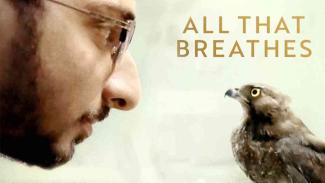This year, in the mainstream media discourses, there was considerable discussion, celebration and often chest thumping about “India’s Oscar Story”. The song Naatu Naatu from S.S. Rajamouli’s Telugu film RRR won the Oscar for the Best Original Song and Kartiki Gonsalves directed The Elephant Whisperers won the Academy Award for the Best Documentary Short. Immediately after the Oscar ceremony, as usual, the BJP Government jumped to take credits. Commerce Minister Piyush Goyal claimed that the Oscar for RRR is a “global endorsement” of PM Narendra Modi’s choice as he “nominated” the scriptwriter of RRR, V Vijayendra Prasad, to the Rajya Sabha in July 2022! Of course, what else? From Neeraj Chopra’s Olympic Gold to 2023 Oscars, everything is because of Modiji making India vishwaguru! Leaving aside the absurdities and megalomania in our current political times, probably the most significant film to discuss is Shaunak Sen’s All That Breathes which was also nominated for the Academy Award for the Best Documentary Feature Film.
The website of the documentary All That Breathes offers a crisp note what this film is all about: “In one of the world’s most populated cities, two brothers — Nadeem and Saud — devote their lives to the quixotic effort of protecting the black kite, a majestic bird of prey essential to the ecosystem of New Delhi that has been falling from the sky at alarming rates. Amid environmental toxicity and social unrest, the ‘kite brothers’ spend day and night caring for the creatures in their makeshift avian basement hospital. Director Shaunak Sen explores the connection between the kites and the brothers who help them return to the skies, offering a mesmerizing chronicle of inter-species coexistence.” Beside the documentary’s nomination for Academy Award, it won Grand Jury Prize at the Sundance Film Festival and Golden Eye at the Cannes Film Festival. All That Breathes has also received glowing reviews, both in national and international press.
There is no doubt that Sen’s All That Breathes is a well-crafted smart film, capturing the environmental and political apocalypse in the city of Delhi. The narrative of hope in times of hopelessness and despair is also truly inspiring. Here we are not offering yet another review of the documentary, but going to talk about some serious limitations of the political imagination of the film.
All That Breathes is a festival circuit film, a work which is immensely successful in multiple international film festivals. If we look at the emergence of recent festival circuit documentary phenomenon, there are several unwritten rules and regulations for success. The most important formula is: stay away from any narrative of any collective, focus on “intriguing stories” of individuals. All That Breathes also picks up the “fascinating story” of the two kite brothers – Nadeem and Saud. The documentary was shot in the backdrop of anti – Citizenship Amendment Act (CAA) protests, but Sen’s camera consciously stays away from that as much as possible. Of course, the film makes references to communal madness and anti-Muslim violence in the national capital, but in a terribly cautious way. Saud’s wife also goes to participate in the protests, but the camera never takes us there. Talk about politics, but smartly, in a more palatable way – without ruffling feathers! Two Muslim bothers running an NGO to save black kites is a “captivating story” for the festival circuit audiences, but not a moment about the Muslim women collectively fighting back the authoritarian ruling regime. And it is not only about this film, documentaries after documentaries consciously erase the idea of collective, as it is not “fashionable” and “cool” anymore.
Another issue with the documentary is that it is too polished. In multiple reviews, the film is called “exquisite”, “mesmerizing”, “majestic” and “beautiful”. If every frame of the documentary becomes too aestheticized, if the claustrophobia becomes enthralling, if the macabre turns into mesmerizing – there are going to be doubts about the political intentions of the makers. What is the objective of the director – just to produce a technically masterful film or also to stimulate and at least too some extent disturb the viewers about the rottenness of our times?
What is most disappointing is the director’s commentaries through multiple interviews after the huge success of the film. Just to give an example, a leading Bengali daily, Anandabazar Patrika, asked Sen in an interview about his alma mater Jawaharlal Nehru University. It also asked, very vaguely, about the “politics” in the university, probably referring to the demonization of university as “anti-national” in the mainstream discourses. To this question, Sen categorically expressed his reluctance to talk about anything related to “politics”. It is perplexing when even mainstream commercial Bombay cinema directors and stars are taking political positions against BJP’s despotic regime, why an Oscar nominated filmmaker wants to play safe when it comes to “politics”!
To conclude, just few days back, Alphons Kannanthanam, posted an update and photos on social media platform, flaunting himself with Guneet Monga, the producer of The Elephant Whispers and Shaunak Sen and celebrating the “proud moment for India”. Alphons Kannanthanam was Minister in the Modi Cabinet and made comments about “districts in Kerala where one feels like Saudi Arabia” and “anti-national thinking originates from a certain dress code”. How does someone like this become so comfortable with a film which, at least indirectly, refer to communal frenzy of our times? Does the Oscar tag make the politics of the film irrelevant and turn into an object for celebration for India’s pride? Or the politics of All That Breathes is palatable, at least to a large extent? Or the film caters to such a niche audience that its progressive politics doesn’t bother them? Before we celebrate the documentary All That Breathes and its’ huge success, probably we need to pause slightly and think twice about these questions.










